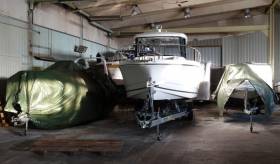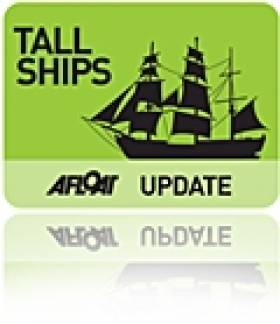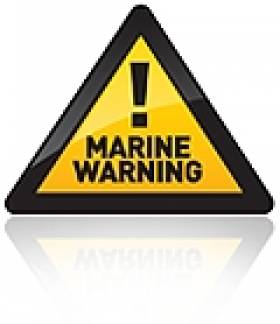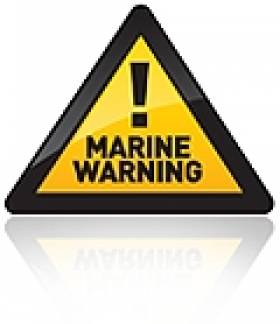Displaying items by tag: maintenance
Top Tips For Winter Boat Maintenance
While some Afloat.ie readers plan to keep sailing through the colder months, and have surely taken note of UK Sails’ recent heavy weather sailing tips, most will have seen or will see their boats lifted out this month.
Either way, this is still an opportune time to maintain your vessel and ensure you’re still ready to sail once spring comes around — and Yachting Monthly has a guide to the essentials you should know for midwinter maintenance.
While modern boatbuilding has made for a hardier product, boat-owners should resist the temptation to simply lift and let live, as frost and cold can affect even the most durable boat.
Don’t put off the small jobs: get your rigging washed and dried, and mend those worn ends. Check your sails over for stitching and any spots of wear or chafing. And remove sensitive electronics like your chart plotter for safer storage at home.
Indeed, clear out your boat as much as you can to keep old and mildew to a minimum. If you’ve lifted out for the winter, be sure to remove all freezable liquids, too, on the off chance a leak leads to hull damage in sub-zero temperatures.
Marine Notices on Vessel Maintenance and Accessibility
#MarineNotice - A recent Marine Notice from the Department of Transport, Tourism and Sport (DTTAS) raises importance of maintenance as highlighted in the MCIB report into the scuttling of fishing vessel Jeanette Roberta in Glandore Harbour in late 2011.
As previously reported on Afloat.ie, the prawn boat was returning to port on 11 December 2011 when the skipper had difficulty switching the helm from auto-pilot to manual due to a known issue with "sticky solenoids". The boat subsequently veered off course without warning and was holed on rocks on Adam's Island.
The official report into the incident castigated the owner/skipper for continuing to sail the vessel with persistent navigation issues - and Marine Notice No 04 of 2013 reminds all fishing vessel operators to ensure that deficiencies with their vessels are rectified without delay.
It is the responsibility of the owner to ensure that a vessel is maintained and operated at all times in accordance with the requirements of the agreed Code of Practice. Owners of all vessels also have a legal obligation to operate their vessels in accordance with the law.
Meanwhile, the latest Marine Notice is directed at passenger vessel owners and operators - encouraging them to continue voluntary efforts to improve accessibility on their vessels.
A new questionnaire has been made available to inform the DTTAS about the extent of accessibility improvements introduced to maritime passenger transport services in the State.
Full details are included in Marine Notice No 05 of 2013, a PDF of which is available to read or download HERE.
How-To Video: Setting a Kedge Anchor
#HOW TO - Sail Magazine have posted a valuable video guide demonstrating how to set a kedge anchor for your vessel.
Every boat should carry a minimum of two anchors to give you security should the wind shift or pick up overnight and cause the boat to sway.
The second anchor should always be a different design to the primary anchor - an aluminium Fortress anchor would be perfect for this, being light to carry should it be needed.
Choice of rope is also important for a kedge anchor, with nylon being the better bet for its strength despite its lightness.
Get all of Sail Magazine's tips for setting a kedge anchor HERE.
#MCIB - The families of two fishermen found dead at sea off the Skerries last April may never uncover the circumstances that led to their demise. But the official report into the incident indicated that the absence of lifejackets was a significant contributing factor.
Ronan Browne (26) and David Gilsenan (41) were reported missing on the evening of 1 April after failing to return from a trip tending to lobster pots.
Their vessel, Lady Linda, was found the following morning upturned in an oil slick off Clogherhead with no sign of the crew.
It wasn't until a week later that their bodies were discovered caught in the vessel's fishing gear some five miles east of Clogherhead, as previously reported on Afloat.ie.
Post-mortem results found that both men died from drowning, with Gilsenan also showing signs of hypothermia.
With no eyewitnesses to the incident, the report by the Marine Casualty Investigation Board (MCIB) indicated a number of possible causes from eqiupment malfunction or shifting of lobster pots on deck, to the wave height and weather conditions on the day, which were reportedly deteriorating when the boat left port.
It also said that Browne and Gilsenan "were lifelong friends, both men were experienced and qualified marine engineers in the fishing vessel industry. Both men were experienced in boat handling and fishing and had worked together on many occasions."
But the report emphasised the lack of personal flotation devices (PFDs) on board, and noted that emergency equipment was stored under the deck and not easily accessible.
The MCIB's recommendations include a review of the code of practice for fishing vessels under 15m to establish "revised stability critera" and ensuring that all boats are fitted with automatic radio beacons that deploy upon capsize.
In a separate incident, lack of proper maintenance led to an unlicenced boat taking on water off Co Kerry last August.
The Claire Buoyant was carrying one crew, five passengers and 21 sheep from Beginish Island to Ventry when the vessel began to lose stability.
Skipper Eoin Firtear - who the MCIB described as having "limited sea-going experience" - and his five passengers were rescued by passenger ferry. All sheep were jettisoned overboard, with 18 eventually recovered.
The report reminded that the carriage of livestock should only be undertaken in appropriately certified vessels.
- MCIB
- Marine Casualty Investigation Board
- report
- Lady Linda
- Clogherhead
- Ronan Browne
- David Gilsenan
- lobster pots
- Fishing
- drowning
- hypothermia
- missing
- malfunction
- wave height
- Weather
- lifejackets
- Personal Flotation Devices
- PFDs
- Code of Practice
- stability
- Radio
- beacon
- maintenance
- unlicenced
- Co Kerry
- Claire Buoyant
- Sheep
- Passengers
- Beginish Island
- Ventry
- Eoin Firtear
- Skipper
- Rescue
- Livestock
Sail Training Schooner Locked Up Since 2007
#TALL SHIPS - The flagship vessel for an Asgard-type sail training programme in Cork has been locked up in a boatyard since 2007, the Irish Examiner reports.
The Omar B was supposed to be the focus of a Youthreach project based in Bantry for early school leavers. But the schooner has spent the last four-plus years in storage in Baltimore, and has been deteriorating due to lack of maintenance - despite the scheme still notionally running, the newspaper report says.
Five two-man dinghies purchased with grant money have also reportedly spent most of 2011 in storage.
Co Cork's VEC has now put the €150,000 sailing programme under review following concerns over storage costs and lack of direction for the project.
The 75ft Omar B was donated to the CCVEC by owner and builder Don Attig in 2003 and refitted for use by students thanks to generous voluntary funding. Attig said the boat was of immense benefit to students who would not otherwise be in education.
The Irish Examiner has much more on the story HERE.
Is Your Lifejacket Safe? Free Test at Dun Laoghaire Marina this Sunday
Is your lifejacket safe? That's the question the RNLI is asking sailors this Sunday at Dun Laoghaire marina. And If last year's clinic's statistics is anything to go by then the answer is most likely no.
Over 90% of lifejackets tested at Ireland's two biggest sailing centres failed simple checks carried out by the Royal National Lifeboat Institute in 2010. From 91 jackets tested in Cork and Dublin, 83 failed a free inspection. More here.
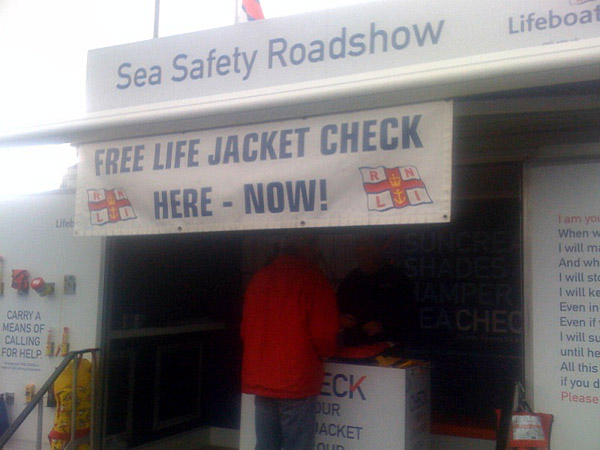
This year the Dun Laoghaire marina initiative with the RNLI aims to get more boat owners, sailors and crews to avail of the free test carried out at the clinic.
The Dun Laoghaire offshore lifeboat will be in the marina's Emergency Berth to allow you to get an close up inspectionand there will be RNLI personnel available to discuss any safety advice or search and rescue questions you may have.
The RNLI will also be taking bookings for a free onboard visit to your boat by the local Sea Safety Officer.
Will your lifejacket work when you need it? Do you know how to make sure it's a correct fit? Do you know how to look after it? All these questions and more will be answered by trained RNLI Sea Safety advisors.
You can learn the importance of choosing, fitting and the maintenance of a lifejacket from 11am to 4pm in Dun Laoghaire at the Lifejacket Clinic with RNLI Sea Safety Team. Likely topics as follows:
Which one?
There are many different types of lifejackets and buoyancy aids on the market. We can help you decide which one is best suited to your needs.
What size?
Size matters! A lifejacket or buoyancy aid will only work properly if it is properly fitted. We can show you how to adjust the lifejacket to a proper fit and why crotch straps are an essential part of the kit.
Looking after it.
It is essential to look after the buoyancy aid or lifejacket properly. With proper maintenance and regular servicing, your lifejacket will last longer and you can ensure it remains reliable. At our lifejacket clinic you can find out what checks to carry out on your lifejacket and how to care for it.
When to wear it?
RNLI volunteer crew wear a properly fitting lifejacket with crotch straps whenever the go afloat on the lifeboat, no matter what the weather. The RNLI believes that lifejackets are useless unless worn. All too often, RNLI crews recover people from the water who were not wearing lifejackets, and have not survived. A lifejacket can buy you time for the rescue services to get to you.
Launching? Check Your Boat Maintenance
"Many of the water-based incidents that we deal with at this time of year involve engine breakdown as a result of lack of maintenance," says Garry Hall of the UK's Solent Coastguard. "People report running out of fuel, sometimes because fuel indicators are broken or because fuel can't get through pipes and the engine is starved. Electrical issues are also a frequent problem. Often oxidation happens if engines are laid open to the elements and it affects the wiring. Engines are susceptible to frost so following our cold winter they will certainly need a good service."
Ideally attend a Diesel engine maintenance course, see:
www.rya.org.uk/coursestraining/courses/specialist/Pages/Diesel.aspx
Whilst you're considering maintenance, don't forget to look at your lifejackets and make sure that they are functioning fully. Remove the cylinders and auto-mechanisms, washing them in fresh water. Now inflate the lifejackets using a hand pump, leaving them for 24 hours to make sure that they don't deflate. Then reassemble the lifejacket, ensuring that the cylinder is screwed back in securely. The RNLI have some good advice about how to maintain your lifejacket on their website. Go to www.rnli.org.uk/seasafety
Appropriate and fully functioning communications equipment will be vital should you find yourself in an emergency situation. Have you got all the right equipment?
Check all your existing communication equipment. Ensure your VHF DSC radio unit's MMSI registration is up to date with Ofcom so that the Coastguard has the right emergency contact details. If you have an emergency position-indicating radio beacon (EPIRB) or a personal locator beacon (PLB), replace batteries before they expire and don't just rely on the "test" button. Also ensure the beacon's registration details are up to date so that the Coastguard has the right emergency contact details and correct information for both yourself and your vessel.



























